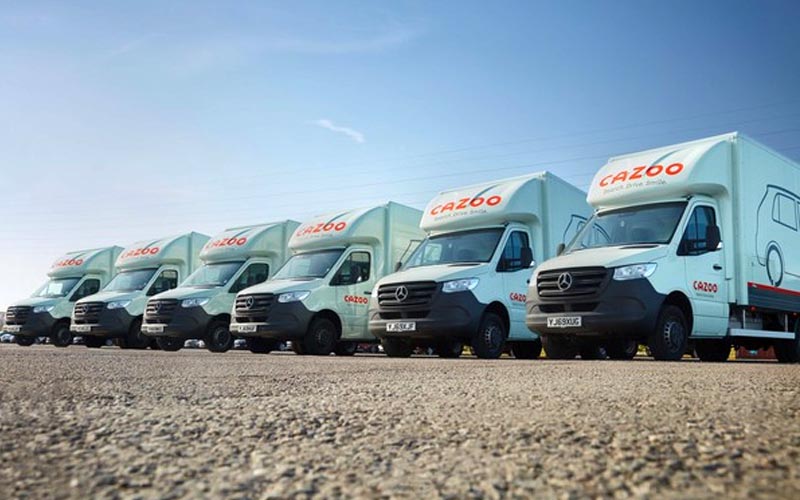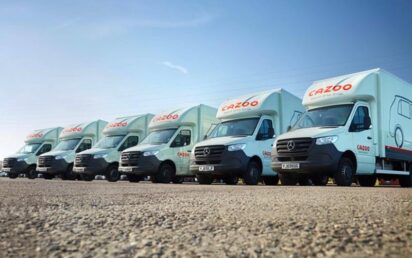Last week’s news that administrators had been called into one-time tech unicorn Cazoo shocked nobody.
Founded in 2018 by serial tech entrepreneur Alex Chesterman, Cazoo burst onto the scene with a mission to make buying a car as simple as buying any other product online.
The startup quickly became Europe’s leading online car retailer with around 5,000 staff and achieved record unicorn status in 2020 – just 18 months after being founded.
An aggressive marketing campaign saw Cazoo sponsor everything from Premier League football clubs Aston Villa and Everton, darts, horse racing, snooker and even fishing.
The company listed on the New York Stock Exchange in 2021 and grew revenues to £1.2 billion in 2022 as Covid produced a new army of online shoppers.
So what went so spectacularly wrong?
One former senior member of Cazoo staff told BusinessCloud: “It’s very sad how it ended. It really was the best job I ever had. I loved it – but (the move into) Europe changed everything. The magic had gone.
“I still believe the business model works, even if the traditional dealers do not, but grew far too quickly and made some catastrophic decisions along the way.
“Cazoo bought brumbrum, Cluno, Swipcar and sponsored a whole host of European teams, only to pull the plug within 12 months. If the focus was on the UK with a smaller valuation, I think it would still be operating today.”
Another well placed source in the car industry told me that Cazoo’s major undoing was its relationship with BCA (British Car Auctions) – the UK’s largest used vehicle business – and WeBuyAnyCar.
He explained: “The key to success in automotive retail is to have a stable secure vehicle pipeline. Used car supply is particularly tricky given what are often fickle sellers.
“Cazoo created a really strong brand, a novel proposition and premium service to your door.
“To sustain success it needed to have access to a wide range of competitively priced vehicles.
“In the UK it strove to deliver this via a tie-up with the market leading BCA car auction and its sister business WeBuyAnyCar. This created the stock fire power to grow rapidly across the UK.
“Unfortunately for Cazoo management, they did not own the supply chain and had no meaningful sizeable alternative.
“After WeBuyAnyCar / BCA the next route to meaningful levels of used car stock is via the new car franchises who have no incentive to support their competitor in used car retail – Cazoo.”
He said the writing was on the wall with the arrival of competitor Cinch, whose TV adverts are fronted up by former X Factor contestant Ryan Clark.
The insider added: “Once Cinch, a disruptor stripping all the good attributes of Cazoo, was launched by the owners of WeBuyAnyCar / BCA there was the inevitable supply switch off. It signalled the inevitable demise of Cazoo, as without the meaningful vehicle stock there was nowhere to go.
“Expansion and acquisition compounded the fundamental issue, cost base was out of sink with the revenue.
“Patient capital may have waited but Cazoo pursued the riskiest fund raise via a de-Spac. Certainly no patient or long view capital here.”
A de-Spac is the process where a private company goes public by merging with a special purpose acquisition company (SPAC).
The industry insider added: “When the global tech stock re-base occurred in 2022/23. Cazoo was hanging on to the scorpion’s tail.
“A flawed business model, in a toxic capital market place, saw its inevitable demise.
“Cazoo should have secured an equity tie-up with the backers of WeBuyAnyCar /BCA in their early days and they’d be heading for their North Star still.”
However, look a bit deeper, and warnings about Cazoo’s business model were being raised as long ago as 2021.
At the time Kevin Gaskell, chairman of Warrington-based ITS Technology Group, expressed his incredulity when Cazoo floated on the US Stock Exchange with an eye-watering valuation of $7bn.
Gaskell knows a thing or two about online car sales after previously resigning as CEO of BMW GB because he was convinced that the internet would completely disrupt the way people bought cars.
Gaskell was ahead of his time but by 2021 everyone was shopping online and Cazoo was one of a number of players in the market.
Cazoo, once valued at £5bn+, to collapse into administration
Explaining Cazoo’s business model, Gaskell wrote in 2021: “The company buys used cars which it reconditions and then offers for sale through its website.
“A sold vehicle is delivered to the buyer in a liveried truck. Customers who prefer not to transact online can complete their transaction at one of the network of Cazoo customer centres or dealerships.
“This is exactly the same process that has been in place for many years and is operated by every decent mainstream car dealer, with the difference that car dealers also offer new cars, vehicle servicing and support.
“What’s so surprising is that, despite the model being limited and unoriginal, Cazoo has just been floated with a valuation of $7billion!
“What Cazoo has done differently is to apply a strategy of ‘brand bingo’. In brand bingo, the winner is the first player to cover every brand alignment box in the market.
“What can possibly justify such a valuation? Cazoo is not a tech stock. It is not a new route to market. It is not even a radical or fresh approach to existing processes. It is simply a landgrab.
“The company is playing brand bingo by spending enormous sums of cash from financial investors who know nothing about customers, but who are wagering that the sheer power of their money will blitz market share.
“Whether Cazoo succeeds will depend on how susceptible the car buying public is to brand awareness and the mass marketing of what is actually, a very limited offer.
“It will also depend on the ability of the existing automotive players to adapt to a continuously changing market, by delivering products and services which retain clients.
“There’s nothing new here except the astonishing price of the bingo card. The financial markets have placed their bets in the expectation of winning the big prize. The question is how much notice car buyers will take of the bingo caller’s shout.”
David Foreman, managing partner and co-founder at Praetura Ventures, was similarly sceptical, pointing out in 2022 that Cazoo was making just £100 gross profit per car sold.
He reshared his original post last week, describing Cazoo as an ‘awful business’ with ‘truly atrocious unit economics’.
What’s clear is Cazoo’s profile rocketed during Covid as customers started buying cars without ever visiting a showroom.
However, when the dust settled after the pandemic, the reality was that Cazoo wasn’t really a tech disruptor at all but just another car retailer and competitors started selling online.
Other analysts have questioned Cazoo’s decision to float on the US Nasdaq in 2021 through something called a SPAC merger.
Listing on Nasdaq can give companies access to huge amounts of capital but the collapse of Silicon Valley Bank, combined with the macroeconomic impact of the war in Ukraine and other global events, has meant it’s a very different world today.

Alex Chesterman, founder, Cazoo. He exited the business in 2023
In January 2023 Cazoo’s founder Alex Chesterman – who previously co-founded LoveFilm and Zoopla – stepped down as CEO after the startup’s share price plummeted by around 98 per cent.
COO Paul Whitehead took over the day-to-day CEO duties but was unable to turn Cazoo’s fortunes around.
In March 2024 it was announced Whitehead would also be leaving and Cazoo would be pivoting away from being a dealer, where it bought and sold cars itself, to a marketplace where consumers could buy and sell cars in the style of Manchester-headquartered Auto Trader.
Whitehead signed off with an upbeat LinkedIn post.
“Since starting Cazoo from a sheet of paper a little over five years ago, it’s been an incredible journey and it’s been an absolute privilege to lead an amazingly talented team of 5,000 people at its peak, across the UK and Europe,” he wrote.
“Following the recent strategic review of the business, I decided that my time as CEO should come to a close at the end of March.
“This wasn’t an easy decision – Cazoo means a lot to me but I have agreed to remain as an advisor to the business to support the transition to its new marketplace business model.
“Five years ago it wasn’t possible to buy a used car entirely online in the UK. We set out to break the mould and create a new category for buying and selling a used car online and we have sold 160,000 cars this way.
“The Cazoo brand and platform attracts one million customers a month, is firmly established and has led the category. We now plan to leverage all of this for the benefit of the automotive industry.
“Looking back, we have accomplished so much, made mistakes along the way for sure but learnt a lot at the same time. I am incredibly proud of what we achieved together.
“Thank you to everyone who has shown such an amazing passion and energy for the Cazoo customer experience. For those staying as part of the transition, please never lose your data-driven mindset, but above all your entrepreneurial spirit.”
The court of public opinion has been less kind following news of Cazoo’s administration.
Dom McNally, CEO of Alder Energy wrote: “Valuation was the aim, storytelling was the game. Executed very well in that regard. A business that was never ever going to work.”
The history books of failed UK tech businesses will need to add a separate chapter on Cazoo. Ultimately the question that will get asked won’t be ‘why did Cazoo go into administration so soon?’ but rather ‘how did it manage to last as long as it did?’


